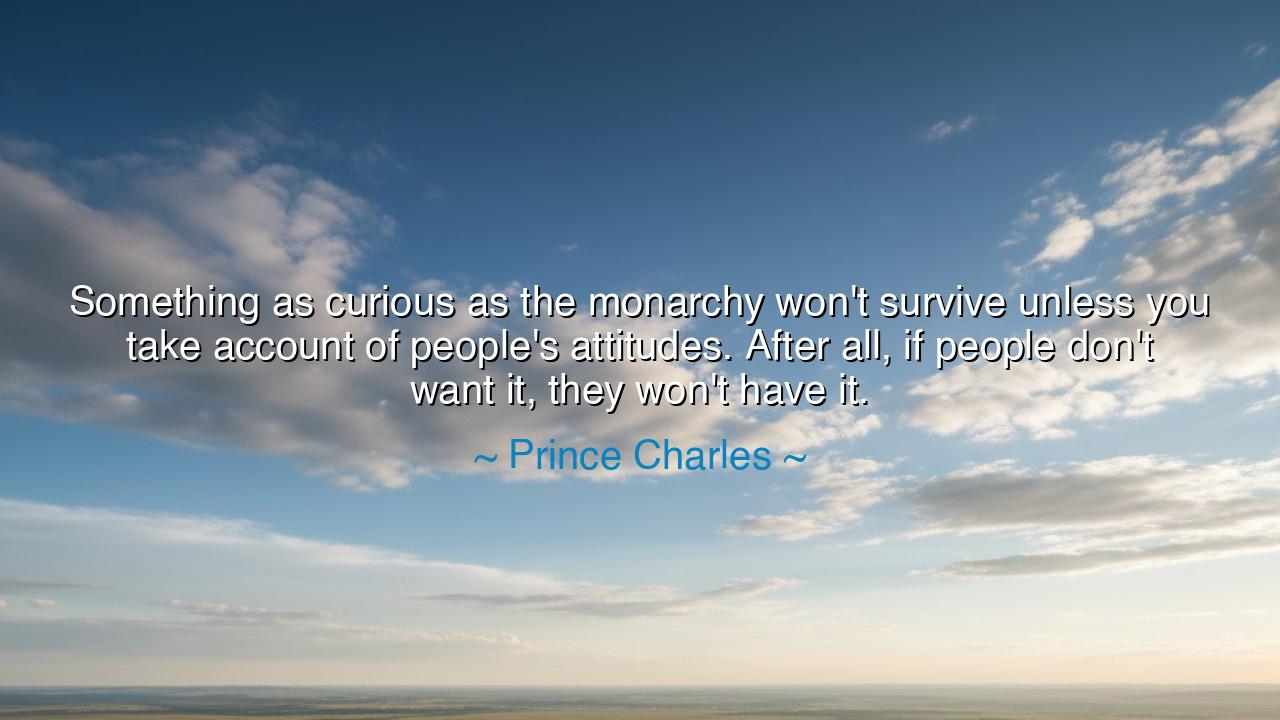
Something as curious as the monarchy won't survive unless you
Something as curious as the monarchy won't survive unless you take account of people's attitudes. After all, if people don't want it, they won't have it.






In the reflective and measured words of Prince Charles—now King Charles III—we find a rare honesty about power and the fleeting nature of tradition: “Something as curious as the monarchy won’t survive unless you take account of people’s attitudes. After all, if people don’t want it, they won’t have it.” These words carry the quiet gravity of a man born into an institution as ancient as the stones of Britain itself, yet wise enough to see that even such institutions live only by the will of the people. His statement is not an act of defiance, but of humility—a recognition that authority without consent is an illusion, and that even the oldest crowns rest upon fragile foundations: trust and relevance.
The origin of this quote lies in an interview given by Prince Charles during the late twentieth century, when the British monarchy faced waves of public scrutiny. The world was changing; the age of unquestioned reverence for royalty was fading. Mass media had peeled away the mystery that once surrounded the throne, and the people now demanded transparency, empathy, and purpose from those who ruled. In that moment of shifting tides, Charles spoke these words—not to lament the fragility of monarchy, but to affirm a truth older than kings themselves: that no ruler endures without the love of the governed, and that even divine right must yield to the pulse of the human heart.
To call the monarchy “curious” is, in itself, a profound insight. It acknowledges that this ancient institution—so steeped in ritual, lineage, and symbolism—stands as an anomaly in a modern world of democracy and equality. It is a relic of another age that has survived through adaptability, not power. In centuries past, monarchs ruled through force; today, they reign through meaning. The people no longer bow to the crown—they lend it relevance through belief. When Charles said that “if people don’t want it, they won’t have it,” he recognized that the throne is not sustained by gold or armies, but by affection and faith, renewed in every generation.
History offers countless mirrors to this truth. Consider the fall of Louis XVI during the French Revolution. Once thought to rule by the will of God, he lost not his throne first, but the hearts of his people. When famine gripped the nation and arrogance filled the palace, the divine right dissolved like mist before the morning sun. The people withdrew their consent, and the monarchy, once eternal, crumbled overnight. The same tale unfolds again and again through time—whether in Russia, where the Tsars fell beneath the weight of indifference and anger, or in empires where rulers mistook heritage for immunity. No crown can endure when it forgets the face of its people.
Yet, Charles’s statement is not cynical; it is visionary. He sees that the survival of the monarchy—and indeed, of any institution—depends not upon rigidity, but upon renewal. Tradition, when kept without purpose, decays into superstition. But when tradition listens, adapts, and serves, it becomes a bridge between the past and the future. The wise ruler is not the one who clings to old power, but the one who earns it anew each day through service, humility, and compassion. In these words, Charles hints at a monarchy transformed—not as a symbol of hierarchy, but as a mirror of the people’s hopes and values.
The deeper meaning of his reflection transcends royalty—it speaks to all who hold influence, whether in family, in leadership, or in community. Every relationship of trust, every bond of respect, is bound by the same law: it must be continually earned. The father who ignores the voice of his children loses their loyalty. The leader who rules for himself loses the loyalty of his people. The teacher who stops learning ceases to inspire. Power, in all its forms, is sustained not by command, but by connection. To “take account of people’s attitudes,” as Charles said, is not weakness—it is wisdom.
So, my children, take this teaching as your own: listen to the hearts of those you serve. Whether you wear a crown, lead a household, or simply walk among others, remember that authority is a living bond, not a birthright. Cherish the trust others place in you, and renew it through understanding and kindness. For the moment you cease to care for the people’s will, the foundation beneath you begins to crumble. As even kings must learn, greatness lies not in being obeyed, but in being believed in. And when you serve with humility, the crown you wear—whatever form it takes—will endure, not by force, but by love.






AAdministratorAdministrator
Welcome, honored guests. Please leave a comment, we will respond soon